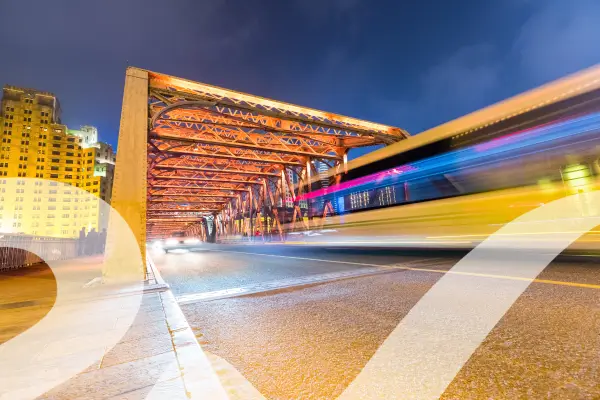Operational traffic control
Smart Traffic Control: Innovative technologies for dynamic traffic control
<p data-start="76" data-end="531">While strategic traffic planning takes long-term developments into account, the focus of <strong>operational traffic management</strong> is on the immediate control and optimization of traffic flows. By using modern data analysis, sensor technology and intelligent traffic management systems, traffic flows can be monitored and controlled in real time. This enables a rapid response to traffic jams, accidents or unexpected traffic peaks. </p>
<p data-start="533" data-end="891" data-is-last-node="" data-is-only-node="">From adaptive traffic lights and dynamic routing to automated traffic control systems – data-driven traffic control makes a significant contribution to increasing efficiency in road traffic. By using innovative technologies, traffic congestion can be minimized, travel times shortened and environmental pollution reduced. </p>
<h2>ITS & Traffic Monitoring</h2>
<p style="margin-bottom: 20px">ITS & Traffic Monitoring optimizes the flow of traffic through the intelligent use of data. With sensors, cameras and GPS, we enable precise analysis, real-time control and sustainable mobility solutions. Our data-driven systems reduce congestion, improve parking space utilization and increase the efficiency of traffic management. </p>
<ul>
<li><strong>Traffic flow analysis</strong>: Collection and evaluation of traffic data to identify the causes of congestion and optimize traffic flow.</li>
<li><strong>Smart Parking</strong>: Use of parking data for better utilization and more efficient management of parking spaces.</li>
<li><strong>Real-time route optimization</strong>: Dynamic adjustment of routes based on current traffic data to minimize delays and emissions.</li>
<li><strong>Smart Mobility</strong>: Networked technologies for a more efficient, sustainable and future-proof transportation system.</li>
</ul>
<h2>Fleet management</h2>
<p style="margin-bottom: 20px">Data engineering and analytics are revolutionizing fleet management through real-time monitoring, driving behavior analysis and predictive maintenance. Our tailor-made solutions optimize efficiency, reduce costs and improve safety and environmental sustainability. By integrating complex data streams and predictive analytics, we enable informed decisions and maximum fleet performance. </p>
<ul>
<li><strong>Vehicle tracking:</strong> real-time monitoring of the fleet’s position to improve logistics and prevent theft.</li>
<li><strong>Driving behavior analysis:</strong> Evaluation of driving behavior to identify potential savings and minimize risks.</li>
<li><strong>CO₂ emission reduction:</strong> Analysis and optimization of routes and driving behavior to reduce emissions.</li>
<li><strong>Predictive maintenance:</strong> Use of vehicle data to predict maintenance requirements in order to minimize downtimes.</li>
<li><strong>Analysis of vehicle efficiency:</strong> Evaluation of fuel efficiency to promote more environmentally friendly transportation options.</li>
</ul>
<h2>Local public transport – ÖPNV</h2>
<p style="margin-bottom: 20px">Data-based optimization makes local public transport more efficient, user-friendly and sustainable. We use real-time and historical data analysis to improve passenger information, optimize transport networks and flexibly adapt timetables to demand. These solutions increase service quality, reduce environmental impact and support informed decision-making. </p>
<ul>
<li><strong>Dynamic passenger information systems</strong>: Provision of real-time information on timetables, delays and connections.</li>
<li><strong>Transport network analysis</strong>: Identification of bottlenecks and optimization of the network infrastructure for trouble-free operation.</li>
<li><strong>Timetable optimization</strong>: Adjustment of timetables on the basis of passenger data to improve capacity utilization and increase efficiency.</li>
<li><strong>Ticketing and pricing</strong>: Development of flexible pricing models based on usage patterns and utilization.</li>
<li><strong>Energy efficiency</strong>: Reducing the energy consumption of vehicle fleets through intelligent evaluation of operating data.</li>
<li><strong>Delay analysis</strong>: Root cause analysis through real-time monitoring and historical data evaluation to minimize delays.</li>
</ul>




